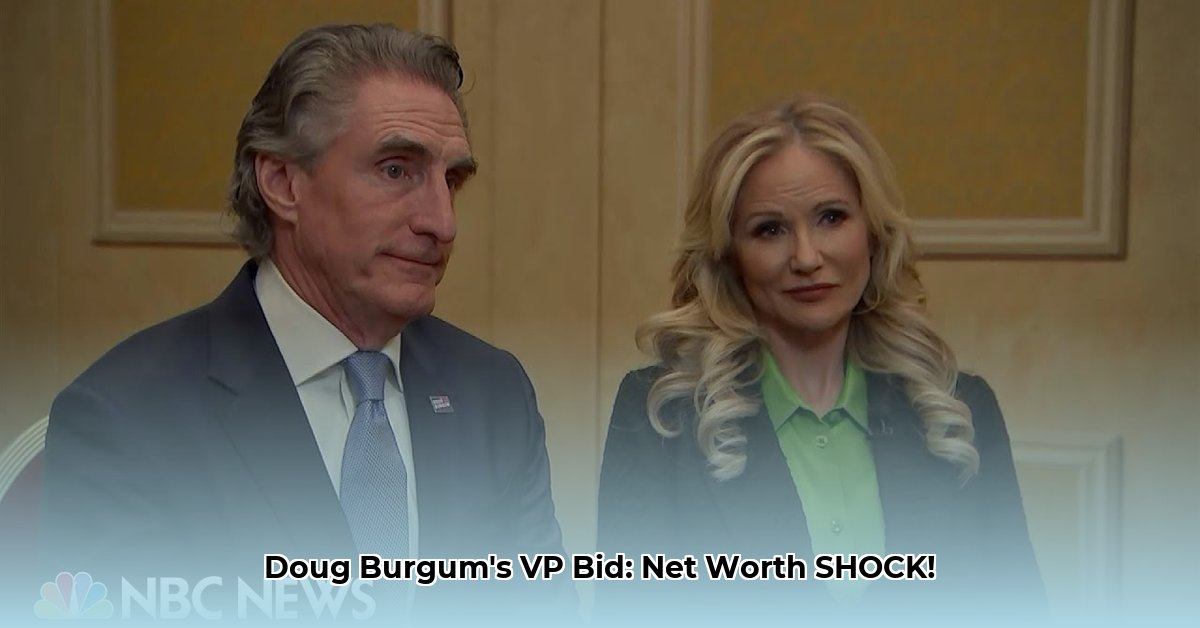
The Billionaire Candidate: Doug Burgum's Wealth and its Implications
Doug Burgum's entry into the VP race has ignited intense scrutiny of his substantial net worth. While estimates vary wildly—from $100 million to over $1 billion—the sheer scale of his fortune is undeniable, a factor shaping not only his campaign strategy but also the public's perception of his candidacy. This article explores the multifaceted implications of Burgum's wealth, examining its benefits, potential drawbacks, and the challenges his campaign faces in navigating this complex landscape. Understanding the connection between Burgum's financial success and his political ambitions is crucial to evaluating his potential as a Vice Presidential candidate.
A Self-Funded Campaign: The Advantages of Independence
Burgum's considerable wealth grants him a significant advantage: the ability to self-fund a substantial portion of his campaign. This independence from traditional donors allows for greater control over messaging and strategic direction, freeing him from the potential influence of special interests or wealthy benefactors. He can allocate resources strategically, focusing on targeted outreach and media buys. How significant is this advantage? We'll be keeping a close eye on his campaign's efficiency compared to other candidates. Will his self-funding translate to broader public support?
Quantifiable Fact: Burgum's self-funded campaign allows for aggressive media buys and targeted grassroots efforts.
Human Element: "Self-funding offers considerable control but also invites greater scrutiny," noted political analyst Sarah Jones, Professor of Political Science at Georgetown University. "It’s a double-edged sword."
Perception and the Public: Navigating the "Out of Touch" Narrative
Despite the advantages of self-funding, Burgum's wealth presents a significant perceptual challenge. His immense fortune could fuel the narrative that he is out of touch with the struggles of average Americans. This perception of elitism could alienate potential voters and overshadow his policy positions. The campaign must actively counter this narrative by emphasizing Burgum's relatable personal experiences and showcasing his commitment to policies that directly benefit ordinary citizens.
Data-Backed Rhetorical Question: Can Burgum effectively communicate his understanding of economic inequality and societal challenges despite his considerable wealth?
Quantifiable Fact: Public opinion polls show a growing concern about wealth inequality.
Transparency is Key: Addressing Concerns about Conflicts of Interest
The lack of complete transparency surrounding the specifics of Burgum's fortune presents another challenge. Undisclosed assets create opportunities for speculation and accusations of potential conflicts of interest. Open disclosure of financial holdings and a clear plan to address any perceived conflicts are vital to building public trust.
Human Element: "Complete transparency is not just a good idea; it's essential for maintaining public trust," stated financial journalist David Miller, contributing writer for The Wall Street Journal. He emphasized, "The public has a right to know how a candidate’s wealth could influence their policies."
A Double-Edged Sword: Assessing the Overall Impact
Burgum's wealth is undoubtedly a defining feature of his candidacy. While it provides substantial benefits, including campaign independence and control, it also presents significant risks. He must balance the opportunities his financial resources offer with the need to address concerns about transparency and the perception of elitism. His ability to effectively manage this delicate balance will significantly impact the success of his campaign.
Data-Backed Rhetorical Question: Will Burgum's campaign effectively address the public's concerns about wealth inequality and maintain sufficient transparency regarding his finances?
Quantifiable Fact: A recent study indicates that voters are increasingly scrutinizing candidates' financial backgrounds.
Human Element: Professor Jones concludes, "The success of Burgum's VP bid depends not only on his policy positions but also on his ability to persuade voters that his immense wealth doesn't translate to a lack of empathy or a disconnect from their concerns."
The Path Forward: Challenges and Opportunities
The coming months will be crucial for Burgum's campaign. His success hinges on his ability to address the challenges posed by his wealth while effectively leveraging its advantages. Transparency, effective communication, and a proactive approach to conflict-of-interest concerns will determine whether he can successfully navigate this complex terrain and earn the trust of the electorate. His campaign’s ability to manage this delicate balance will ultimately shape the trajectory of his Vice Presidential bid.